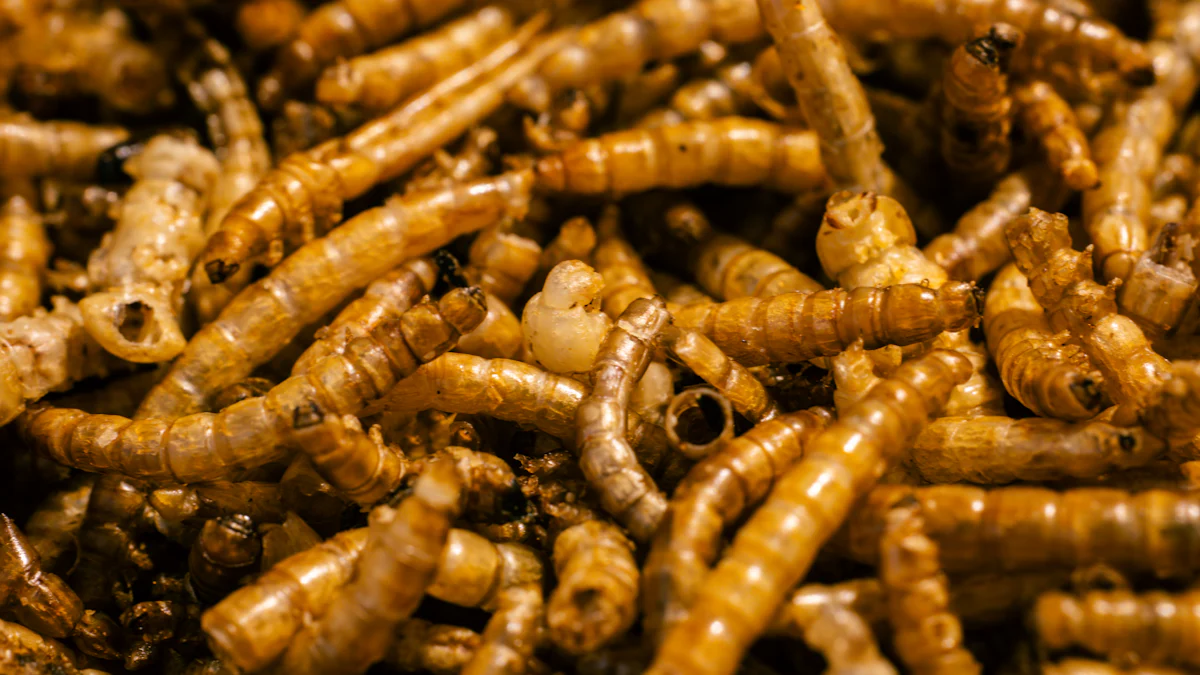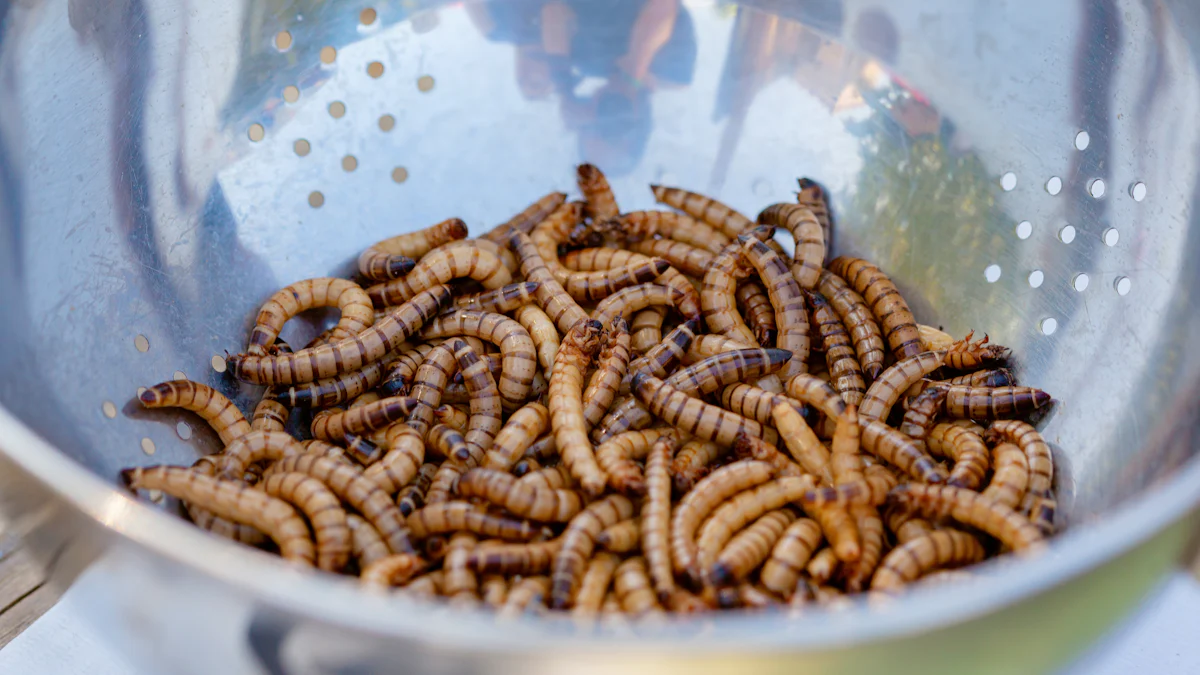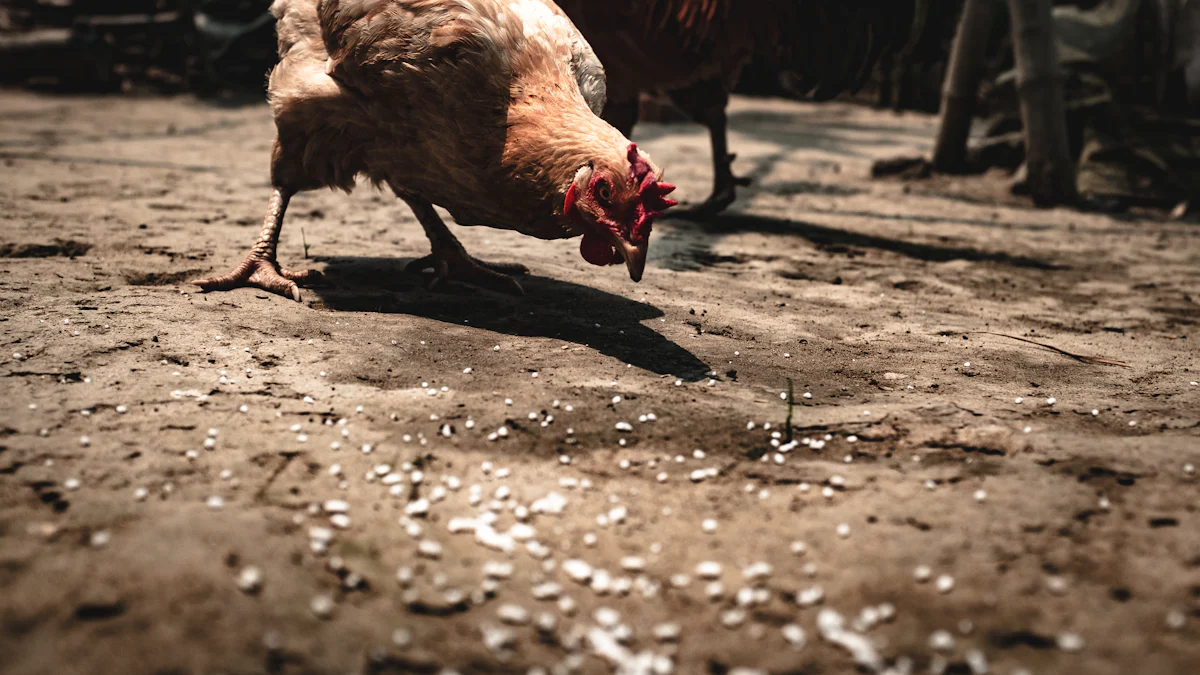
Yes, chickens can safely enjoy dried mealworms for chickens when you feed them responsibly. These treats pack a punch with 50-60% protein, making them perfect for growth and molting. To keep your flock healthy, limit dried mealworms for chickens to 5-10% of their diet. Their long shelf life and mess-free nature make them a convenient choice for you.
Key Takeaways
- Dried mealworms are a high-protein snack for chickens. They have about 52% protein. Feed them only 5-10% of the chicken’s diet to keep it balanced.
- Add dried mealworms slowly to your chickens’ food. Begin with small portions mixed into their usual feed so they can get used to it.
- Buy good-quality dried mealworms from trusted sellers. This makes sure your chickens get safe and healthy food without bad chemicals.
Nutritional Benefits of Dried Mealworms for Chickens

High Protein Content
Protein is one of the most important nutrients your chickens need, and dried mealworms deliver it in abundance. With a whopping 52% protein content, they outshine many other common chicken feeds. Take a look at this comparison:
| Feed Type | Protein Content (%) |
|---|---|
| Dried Mealworms | 52 |
| Black Soldier Fly Larvae | 40-45 |
| Common Chicken Grains | N/A |
This high protein level makes dried mealworms a fantastic choice for supporting your flock’s growth, energy, and overall health. Plus, they’re a cost-effective alternative to live worms, offering the same nutritional punch without the mess or hassle.
Essential Vitamins and Minerals
Dried mealworms for chickens don’t just stop at protein—they’re also packed with essential vitamins and minerals. Here’s what they bring to the table:
- B-vitamins for energy and metabolism
- Magnesium, zinc, iron, copper, and manganese to support bone health and immunity
- Some vitamin C for added antioxidant benefits
In fact, dried mealworms contain higher levels of iron, copper, and zinc than many other foods like eggs, pork, or beef. They even boast impressive amounts of vitamin E, which is over four times higher than what you’d find in pork or lamb.
Why Protein Matters for Chickens
Why is protein such a big deal for your chickens? It’s the building block for feathers, muscles, and eggs. During molting, when chickens shed old feathers and grow new ones, their protein needs skyrocket. Protein also plays a key role in egg production, ensuring your hens lay strong, healthy eggs. By adding dried mealworms to their diet, you’re giving them the fuel they need to thrive.
Feeding Guidelines for Dried Mealworms
Recommended Quantity
When feeding dried mealworms to your chickens, stick to the right amount to keep them healthy. For an average-sized adult chicken, 10-12 dried mealworms per day is ideal. This amount provides a great protein boost without overloading their diet. During special times like molting, breeding, or extreme weather, you can double this amount to meet their increased nutritional needs.
Dried mealworms offer exceptional value compared to live worms. They’re packed with protein, cost less, and have a long shelf life. Plus, they don’t need refrigeration and are mess-free, making them a hassle-free way to improve your chickens’ diet.
Feeding Frequency
You don’t need to give dried mealworms to your chickens every day. Instead, offer them as a treat once or twice a week. This keeps their diet balanced and prevents overfeeding. If your chickens eat about 1/2 cup of feed daily, limit dried mealworms to around 1 tablespoon. This ensures mealworms make up no more than 10% of their total diet.
Best Practices for Feeding
To get the most out of dried mealworms for chickens, follow these tips:
- Start small. Introduce mealworms gradually to avoid upsetting their digestion.
- Use them as a treat. Mealworms should supplement their regular feed, not replace it.
- Choose a fun feeding method. Sprinkle mealworms on the ground, in a dish, or scatter them to encourage natural foraging behavior.
- Always provide fresh water. This helps your chickens digest their food properly.
By following these guidelines, you’ll keep your flock happy and healthy while enjoying the convenience of dried mealworms.
Health Benefits of Dried Mealworms for Chickens
Supporting Molting and Feather Growth
Molting can be a stressful time for your chickens. They lose old feathers and grow new ones, which takes a lot of energy and nutrients. Did you know that feathers are made up of about 85% protein? That’s why your chickens need extra protein during this period. Dried mealworms are perfect for this. They’re packed with high-quality protein that helps your flock regrow their feathers faster and stay healthy.
During molting seasons like autumn or spring, mealworms also give your chickens a boost in zinc. This mineral reduces frayed feathers and prevents blisters on feather shafts. With approximately 8,500 feathers to replace, your chickens will thank you for the extra nutrition. By feeding them dried mealworms, you’re ensuring they come out of molting vibrant and ready to thrive.
Boosting Egg Production
If you want your hens to lay more eggs and improve their quality, dried mealworms are a great choice. They provide essential nutrients like protein and healthy fats, which are key for egg production. Mealworms also enhance the amino acid profile in your chickens’ diet, leading to stronger eggshells and richer yolks.
You’ll notice more consistent laying when you add mealworms to their diet. Plus, the eggs will look and taste better. Whether you’re raising chickens for personal use or selling eggs, mealworms can make a noticeable difference.
Enhancing Overall Health
Dried mealworms for chickens don’t just help with molting and egg production—they improve overall health too. They’re loaded with protein for muscle development and feather growth. The healthy fats provide energy and help your chickens absorb vitamins.
Mealworms also contain fiber for better digestion, along with vitamins like B12 for nerve function and D for bone strength. Minerals like calcium and phosphorus keep your flock’s bones strong and healthy. By including mealworms in their diet, you’re giving your chickens a well-rounded nutritional boost.
Risks and Precautions
Risks of Overfeeding
Feeding your chickens too many dried mealworms can cause several health problems. Here’s what you need to watch out for:
- Obesity can develop due to the calorie-dense nature of mealworms. This can lead to reduced mobility, lower egg production, and even heart issues.
- Digestive upsets like diarrhea or intestinal blockages may occur if your chickens consume too many mealworms.
- Nutritional deficiencies can arise when mealworms dominate their diet, as they lack the variety of nutrients found in grains, seeds, and greens.
You might notice signs like lethargy, changes in droppings, or reduced appetite. If this happens, it’s best to adjust their diet and consult a vet if needed.
Protein Imbalance and Fat Content
Mealworms are packed with protein, but too much of a good thing can be harmful. Chickens need a balanced diet that includes grains, seeds, and greens to get all the vitamins and minerals they require. Overfeeding mealworms can lead to nutritional imbalances, affecting their growth, egg production, and overall health.
A diet overly reliant on mealworms might result in deficiencies. Chickens thrive on variety, so treats like mealworms should only complement their main feed.
Choosing High-Quality Mealworms
Not all dried mealworms are created equal. Many are microwaved during processing, which destroys vital nutrients and leaves them hollow. To ensure your chickens get the best nutrition, look for mealworms that are properly preserved.
Here’s what to consider when selecting mealworms:
- Choose suppliers that prioritize safety and nutritional value.
- Ensure the mealworms are farmed and processed sustainably.
- Avoid products with harmful chemicals or additives.
By choosing high-quality mealworms, you’re giving your flock a nutritious treat that supports their health and well-being.
Tips for Feeding Dried Mealworms

Introducing Mealworms to Chickens
If your chickens have never tried dried mealworms before, you’ll need to introduce them gradually. Start by mixing a small amount of mealworms with their regular feed. This helps them get used to the new taste and texture. Another fun way is to scatter mealworms in areas where your chickens like to forage. They’ll see it as a tasty reward while engaging in natural foraging behavior.
You can also offer mealworms as a treat by sprinkling them on the ground or placing them in a dish. If you’re training your chickens, mealworms work wonders as a motivational snack. Just remember to start with small quantities and always provide fresh water nearby. It might take a few tries for your chickens to warm up to this new treat, so be patient and consistent.
Rehydrating Dried Mealworms
Dried mealworms are convenient, but rehydrating them can make them even more appealing to your chickens. Soak the mealworms in warm water for about 10-15 minutes. This softens them and makes them easier to eat, especially for younger or older chickens. Rehydrated mealworms also mimic the texture of live worms, which chickens naturally love.
Rehydrating is especially helpful during hot weather since it adds extra moisture to your chickens’ diet. Just make sure to discard any uneaten rehydrated mealworms after a few hours to prevent spoilage.
Combining Mealworms with Other Feed
Dried mealworms for chickens work best as part of a balanced diet. Mix them with your chickens’ regular feed to enhance its nutritional value. You can also scatter mealworms around the coop or yard to encourage foraging. This keeps your chickens active and entertained while they enjoy their treat.
Remember, mealworms shouldn’t replace their primary feed. A well-rounded diet includes grains, fruits, vegetables, and grit for digestion. By combining mealworms with other food sources, you’re giving your flock the variety they need to stay healthy and happy.
Dried mealworms for chickens are a fantastic treat when you feed them responsibly. They’re packed with protein and nutrients that support molting, egg production, and overall health. Keep their diet balanced by limiting mealworms to 5-10% of their total intake. Always choose high-quality mealworms to ensure your flock thrives while enjoying this nutritious snack.
FAQ
Can baby chicks eat dried mealworms?
Yes, but only in small amounts. Crush the mealworms into smaller pieces to make them easier to eat. Always prioritize starter feed for balanced nutrition.
Are dried mealworms better than live worms?
Absolutely! Dried mealworms offer high protein at a lower cost. They last longer, need no refrigeration, and are mess-free, making them a hassle-free option for you.
How do I store dried mealworms?
Keep them in a cool, dry place. Use an airtight container to prevent moisture and pests. Proper storage ensures they stay fresh and nutritious for your chickens.


